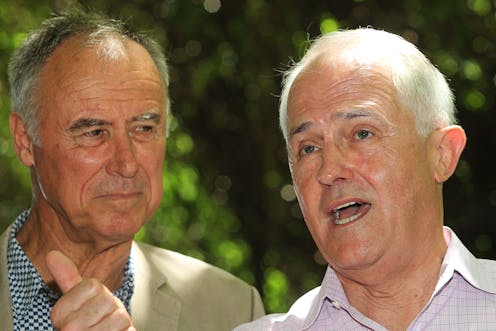Queensland result, while decided on state issues, adds to Turnbull's burdens
- Written by Michelle Grattan, Professorial Fellow, University of Canberra

The Queensland election was decided overwhelmingly on state factors, as Malcolm Turnbull was quick to say on Sunday, but inevitably it has fallout for the Prime Minister.
Four implications are obvious in the result, which ABC election analyst Antony Green predicts will be a majority Labor government, while Inside Story’s Tim Colebatch suggests is more likely to be an ALP minority one.
First, it elevates even higher the importance of the December 16 byelection in Bennelong. Second, it will further unsettle an already depressed and jittery federal backbench. Third, the federal Queensland Coalition MPs will want greater attention from the government.
Finally, the Nationals – in particular the Queensland Nationals - will accelerate a trend that’s been obvious recently, which is to differentiate their brand.
Bennelong was always destined to be significant, from the moment Liberal MP John Alexander resigned (some government sources think prematurely) in the citizenship crisis. But now that things have gone badly for the Liberal National Party (LNP) in a state that looms so large for the federal Coalition, the stakes rise.
Turnbull was campaigning in Bennelong on Sunday, falling back on the tried and trusted ground of border protection, claiming that “right now the people smugglers are using Kristina Keneally’s articles, her statements on this, as a marketing tool” (an assertion surely worthy of a fact check).
He has to get deeply involved in this seat, which is on a 9.7% margin, but the flip side is that the more effort Turnbull puts in, the more he’d be personally identified with a big swing, let alone a loss. On the other hand, if the swing were contained, that would help him.
Psychologically, the Queensland result will send the Coalition’s federal members deeper into the funk caused by the unending run of bad polls and multiple problems engulfing the government. This will accentuate instability and ill discipline, although there is no tangible challenge to Turnbull’s leadership at this point.
The Queensland vote reinforces the now familiar message that people are turned off the major parties. The mid-30s primary votes for Labor (around 36%) and LNP (about 34%) scream disillusionment.
One Nation polled solidly in minor party terms (around 14%) and very strongly in its heartlands, but it couldn’t turn that into the swag of seats it had boasted about. Pauline Hanson’s party fell victim to the inflated expectations it had raised, while the LNP vote fell victim to One Nation.
The result shows the One Nation phenomenon, in terms of its ability to erode the conservative vote, remains a worry, but it does not look like a party on the move.
The Queensland result particularly resonates in Canberra because of how vital that state will be to the Coalition come the election. Federal government members from Queensland will be defensively assertive.
Even before the election, internal chatter had it that senior Queensland Liberal George Brandis would not move out of parliament in the coming reshuffle, as earlier predicted. Revamping cabinet without Brandis while preserving strong Queensland representation would be challenging – and Turnbull could not afford to have Queensland seen to be downgraded.
The federal Queensland Nationals are determined to strengthen their efforts to distinguish themselves from the Liberals and Turnbull.
Nationals cabinet minister Matt Canavan said on Sunday the state result was a “confirmation of how important it is to have a strong National party at a federal level”.
Nationals MP George Christensen went so far as to issue an apology to One Nation voters. It won’t endear him to Turnbull, but he won’t care. One Nation is on track to win Mirani – from Labor – a seat that adjoins Christensen’s electorate with a small overlap.
He tweeted:
Queensland Nationals senator Barry O'Sullivan believes the result shows One Nation is not a threat in terms of House of Representatives seats, but highlights the need for the Coalition to fill the vacuum that party has occupied.
“Malcolm can’t do it himself,” O'Sullivan says. Rather, he says, Turnbull has to allow the Nationals to do this.
O'Sullivan is not one who advocates the de-amalgamation of the LNP in Queensland – as some are doing – but a “divisionalisation”, reinforcing the message of the separate Liberal and Nationals strands within the one party.
This is already underway, with O'Sullivan’s bill for a broad-ranging commission of inquiry into banking and other financial institutions, on which he will have final consultations with sympathisers within the Coalition and other parties on Monday.
He then intends to move a motion in the Senate to have it dealt with immediately after the marriage bill is finished there, and debated until it is resolved. Christensen is ready to back it in the lower house.
Treasurer Scott Morrison is still trying to land initiatives to show the government is acting on the banks, short of a royal commission.
One wonders what Peter Dutton, Liberal holder of a marginal Brisbane seat, who last week was open to the government softening its opposition to a royal commission, is thinking right now.
Authors: Michelle Grattan, Professorial Fellow, University of Canberra





